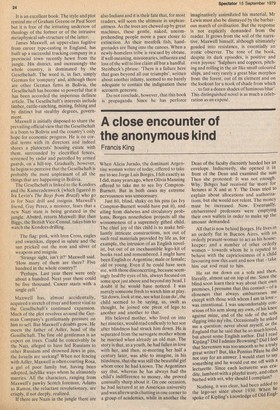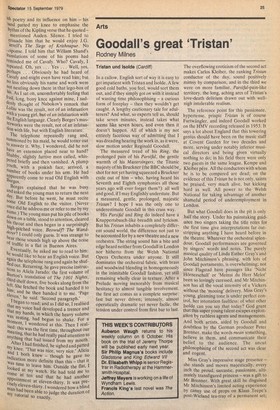A close encounter of the anonymous kind
Francis King
When Alicia Jurado, the dominant Argentine woman writer of today, offered to take me to see Jorge Luis Borges, I felt exactly as I did, many years ago, when Olivia Manning offered to take me to see Ivy ComptonBurnett. But in both cases my extreme nervousness was unnecessary.
Just 80, blind, shaky on his pins (as Ivy Compton-Burnett would have put it), and ailing from diabetes and circulatory problems, Borges nonetheless projects all the winsomeness of a supremely gifted child. The chief joy of this child is to make brilliantly intricate constructions, not out of such real materials provided by life as, for example, the intrusion of an English novelist, but out of an inexhaustible lego-kit of books read and remembered. I might have been English or Argentine; male or female; old or young. Even if he could have seen me, with those disconcerting, because seemingly healthy eyes of his, always focused on some spot just above and beyond my head, I doubt if he would have noticed. I was merely someone fresh to watch him at play. 'Sit down, look at me, see what lean do', the child seemed to be saying, as, swift as thought, he joined one piece of lego to another and another to that.
His beloved mother, who lived on into her nineties, would read endlessly to her son after blindness had struck him down. He is separated from the surrogate mother whom he married when already an old man. The story is that, as a youth, he had fallen in love with her, and then, re-meeting 'her half a century later, was able to imagine, in his blindness, that she was still the beautiful girl whom once he had known. The Argentines say that, whereas he has always had the child's indifference to money, she proved unusually sharp about it. On one occasion, he had lectured at an American university and wa &afterwards chatting in one corner to a group of academics, while in another the Dean of the faculty discreetly handed her an envelope. Indiscreetly, she opened it in front of the Dean and examined the sum Then she protested: It was not enough. Why, Bdrges had received far more for lectures at X and at Y: The Dean tried to explain about allocations and authorisations, but she would not relent. The money must be increased. Now. Eventually, embarrassed professors were emptying their own wallets in order to make up the amount demanded.
All that is now behind Borges. He lives in an orderly flat in Buenos Aires, with an orderly peasant-woman to act as his housekeeper; and a number of other orderly women — towards whom he is reputed to behave with the capriciousness of a child favouring now this aunt and now that — take him out and read to him.
He sat me down on a sofa and then, literally, almost sat on top of me. Since the blind soon learn their way about their own premises, I presume that this contact — of a closeness that always embarrasses me except with those with whom I am in love — was intentional. I was uncomfortably conscious of his arm along my own, of his knee against mine, and of the side of the sofa digging into my ribs. Occasionally he asked me a question: never about myself, or the England that he said that he so much loved, but about some English author. Did I read Kipling? Did I admire Browning? Did I feel that Stevenson was too smooth to be a truly great writer? But, like Pontius Pilate he did not stay for an answer. I would start to say something and he would cut me off with a lecturette. Since each lecturette was erudite, lambent with a playful irony, and often barbed with wit, why should I complain?
Nothing, it was clear, had been added to the lego-set since about 1930. When he spoke of Kipling's knowledge of Old Engl sh poetry and its influence on him — his land patted my knee to emphasise the hythm of the Kipling verse that he quoted — mentioned Auden. Silence. I tried to ersuade him that he would enjoy J.G. arrell's The Siege of Krishnapur, No ••'sponse. I told him that William Shand's translations of some of his poems had reminded me of Cavafy. Who? Cavafy, I repeated. Oh, yes . . . Yes . . . Well, yes, Perhaps . . . Obviously he had heard of Cavafy and might even have read him; but no less obviously his name and work were not nestling down there in that lego-box of Ins. As I sat on, uncomfortably feeling that frail, long, bony knee against mine, I suddenly thought of Nabokov's remark that i-olita was the result, not of an infatuation with a young girl, but of an infatuation with the English language. Clearly Borges's masterworks were the result, not of an infatuation with life, but with English literature. The telephone repeatedly rang and, summoned by his maid, he would totter out to answer it. Why, I wondered, did he not have an extension placed near to hand? Shabby, slightly furtive men called, whispered briefly and then vanished. A plump Youth, with a pinkish face, arrived, a number of books under his arm. He had apparently come to read Old English with barges.
gorges explained that he was busy. and asked the young man to return the next day. But before he went, he must recite some Old English to the visitor. (Never once did he address me or refer to me by my name.) The young man put his pile of books down on a table, stood to attention, cleared lt„.is throat and then began in a surprisingly 'ugh-pitched voice. Beowulf? The Wandderer? I could only guess. It was strange to hear those sounds high up above the noise Of traffic in a flat in Buenos Aires. Eventually, he asked me to read to him: he would like to hear an English voice. But again the telephone rang and again he shuffled out. Returning, he gave precise instructions to Alicia Jurado: the first volume of Burton's translation of The 1001 Nights, third shelf down, five books along from the left. She fetched the book and handed it to rani; and he then handed it to me. 'Page eleven, he said. 'Second paragraph.' t, I began to read; and as I did so, I realised my voice had developed a tremor and that my hands, in which the heavy volume was, resting, had begun to shake. For a rn. oment, I wondered at this. Then I realised: this was the first time, throughout our Meeting, that he had really paid attention to anything that had issued from my mouth. After I had finished, he sighed and patted my knee. 'That was nice, very nice,' Alicia and I both knew — though he gave no indication more definite than this — that it was time to leave him. Outside the flat, I looked at my watch. He had told me to Come at ten and that he had another appointment at eleven-thirty, It was Precisely eleven-thirty. I wondered how a blind man had been able to judge the duration of my tutorial so exactly.



































 Previous page
Previous page